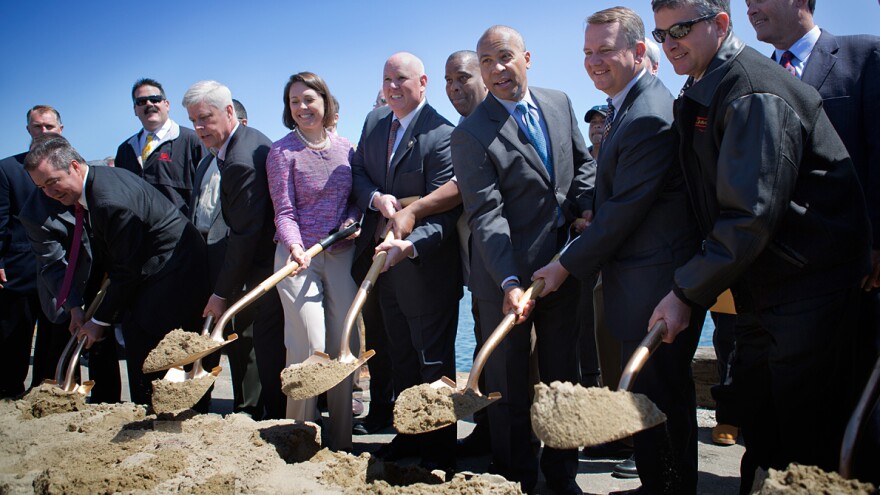A shabby old fishing port on the South Coast of Massachusetts was once known as the City That Lit the World. Its whale oil powered candles and lamps around the country.
Now, the city is trying to rekindle that flame with an alternative form of energy: offshore wind.
A Distant History Of Wealth
New Bedford's glory days are long gone. The city suffers from a long list of woes — high crime, persistent unemployment and poor public schools.
For generations, the sea was New Bedford's lifeblood. Now, the water is still there, but the wealth is gone.
You can see just a glimmer of New Bedford's old opulence shining through its cobblestone streets and the whaling captains' old mansions.
"On the eve of the Civil War, New Bedford was the wealthiest city per capita in the United States," says Mayor Jon Mitchell. "New Bedford was to whaling what Detroit was to automobiles."
Striving For New Opportunities
On a chilly May morning, Mitchell joined state officials and local union representatives to break ground on the New Bedford Marine Commerce Terminal --a 100-million dollar state-funded project.
The port is being described as the first of its kind in the country — big enough to transport wind blades the length of a football field. Locals hope it will serve as the hub for the offshore wind industry and bring in jobs. New Bedford's current employment rate is among the worst in the state.
The Energy Department estimates that if the U.S. takes advantage of its wind potential by 2030, some 20,000 jobs could sprout up around the offshore wind industry.
A quarter of the nation's wind reserves lie just south of Martha's Vineyard, and New Bedford is the closest deep-water port. Mitchell says his city is sitting on the Saudi Arabia of wind.
"New Bedford is the biggest commercial fishing port in America," says Mitchell. "We know what we're doing out on the water."
Contagious Optimism
The mayor's optimism is rubbing off on Justin Silvia, who wakes up at 3:30 am to drive more than an hour to get to his job as a heavy equipment operator. He says he would love to find work closer to home so he could spend time with his three kids. He's trying to land himself a job on this port project.
"There's definitely a big buzz in the area as far as how many jobs it's going to create. I mean, the main focus is get as many New Bedford unemployed workers that are capable and trained properly," he says.
New Bedford is already working with Bristol Community College to secure grants that will train displaced workers.
Skepticism Remains — On The Water And Off
But not all of the folks on the water think offshore wind is the solution to all the city's troubles. Fishermen have been struggling to find work in recent years as the government declared certain waters off limits.
Tony Alvernaz is a fisherman in New Bedford. He wonders how fishermen will be able to navigate around giant wind turbines to find healthy fish.
"New Bedford has been a seafaring city for how many years, how many centuries? And so let's do away with that; let's bring on the wind farm. Is that the answer? I don't think so," he says.
Matt Kaplan, a wind analyst for IHS Emerging Energy Research in Cambridge, says it's a big bet. "Offshore wind will have to be tied to creating jobs in order to really be successful here because of the premium cost."
Kaplan says the problem is that no matter how strong the wind gusts blow, local utility companies have to be willing to pay a premium for pricey offshore wind energy. For now, there are federal subsidies that help nudge development along, but there is no guarantee that the government's helping hand will always be there.
Still, Kaplan said it helps that New Bedford is first in designing an offshore wind-friendly port.
"But whether that's going to make New Bedford the one-stop shop moving forward forever, for being the only port for offshore wind, I think it's a really tough call just because of the need to really create local jobs in each state that has one of these projects," Kaplan says.
Copyright 2021 WBUR. To see more, visit WBUR. 9(MDEwMTk5OTQ0MDEzNDkxMDYyMDQ2MjdiMw004))


